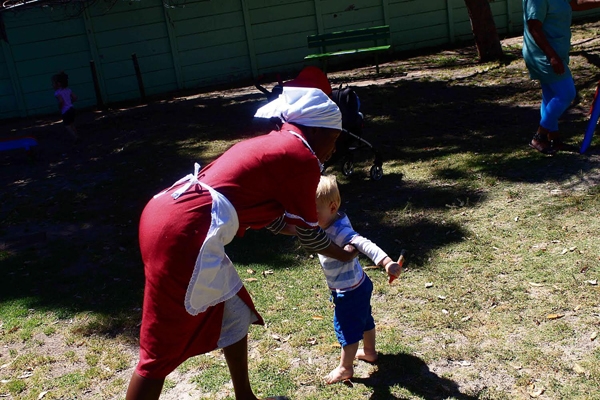Domestic worker unions slam minimum wage increase
Minister promises catch-up to national minimum wage next year

The minimum wage for domestic workers will continue to be below the national minimum for the next year. Archive photo: Masixole Feni
- The minimum wage for domestic workers has been increased from R15.57 to R19.09 an hour.
- This is below the national minimum wage of R21.69 an hour.
- The Minister of Labour has promised to bring the two minimum wages on par next year but domestic worker unions have criticised the disparity.
The minimum wage for domestic workers went up from R15.57 an hour to R19.09 an hour this week. But unions are disappointed that the wage is still not at the level of the national minimum wage.
Employment and Labour minister Thulas Nxesi announced on 8 February 2021, that the national minimum wage for domestic workers would increase from R15.57 to R19.09 from Monday 1 March. This is an increase of 23%, well above the current inflation rate of 3.3% a year, but still below the national minimum wage which is currently at R21.69 an hour.
Eunice Dhladhla of the South African Domestic Service and Allied Workers Union (SADSAWU), said the increase was “just a drop in the ocean”.
“This R19,09 an hour is an insult. We’re not happy about it at all.”
Dhladhla said workers from the union had previously called on employers and the Labour Department to meet them to discuss their grievances but with little success.
“We don’t know what more we can do. We march, we send letters and memorandums to the Department of Labour to put our complaints in writing, but this has fallen on deaf ears. Nobody is listening to us.”
She said that employers were not doing enough to assist their domestic workers who were mostly single parents and were often required to work more than ten hours per day.
“There’s no need for the employers to wait for the department to tell them that they have to pay their workers more. The workers are not cleaning the labour department, they are cleaning your house as an employer. We are human beings,” she said.
Pinky Mashiane of the United Domestic Workers of South Africa (UDWOSA) said they were disappointed that domestic workers were still not earning the minimum wage.
“While farmworkers got R21.69 like all the other workers, we’re still discriminated against.”
“This minimum wage is not a living wage. What can they do with R19 an hour? How can you live off that? Government should have done better than this,” she adds
She said the department was not doing enough to enforce employers to comply with the minimum wage. “There are those who are getting paid R2,000 per month, while others are getting R1,500 because the Department of Labour is not doing enough to enforce employers to comply with the law.”
From January to June 2020, more than 250,000 domestic worker jobs were lost — a drop of about 25% according to the Quarterly Labour Force Survey (QLFS).
Under Covid-19 lockdown level 5 restrictions, many domestic workers were required to stay home and not work, unless they lived with their employers. These regulations were relaxed on 24 May 2020, under level 3. Employers were encouraged to pay workers who could not work, but not all employers did so, and many domestic workers lost their jobs during that time.
Nxesi said based on the findings of the QLFS, the domestic worker sector had been “severely impacted by the initial levels of lockdown and therefore the recommendation was to increase the minimum wage to 88% of the national minimum wage which translates to R19,09 per hour”.
He said the domestic worker wage would be aligned with the National Minimum Wage when the next review is considered.
© 2021 GroundUp. This article is licensed under a Creative Commons Attribution-NoDerivatives 4.0 International License.
You may republish this article, so long as you credit the authors and GroundUp, and do not change the text. Please include a link back to the original article.
We put an invisible pixel in the article so that we can count traffic to republishers. All analytics tools are solely on our servers. We do not give our logs to any third party. Logs are deleted after two weeks. We do not use any IP address identifying information except to count regional traffic. We are solely interested in counting hits, not tracking users. If you republish, please do not delete the invisible pixel.


